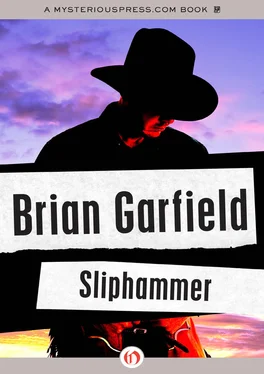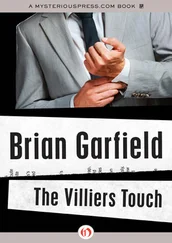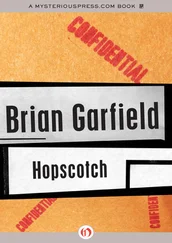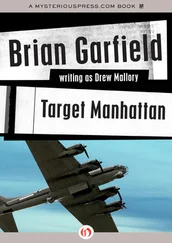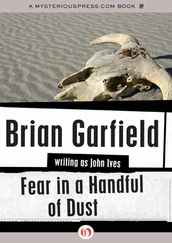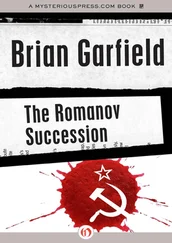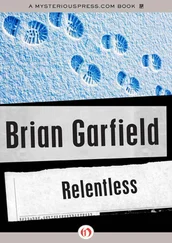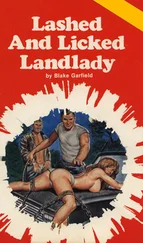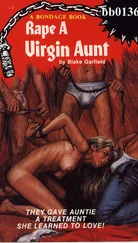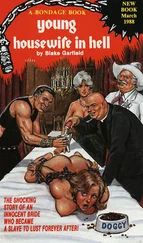Brian Garfield - Sliphammer
Здесь есть возможность читать онлайн «Brian Garfield - Sliphammer» весь текст электронной книги совершенно бесплатно (целиком полную версию без сокращений). В некоторых случаях можно слушать аудио, скачать через торрент в формате fb2 и присутствует краткое содержание. Жанр: Вестерн, на английском языке. Описание произведения, (предисловие) а так же отзывы посетителей доступны на портале библиотеки ЛибКат.
- Название:Sliphammer
- Автор:
- Жанр:
- Год:неизвестен
- ISBN:нет данных
- Рейтинг книги:4 / 5. Голосов: 1
-
Избранное:Добавить в избранное
- Отзывы:
-
Ваша оценка:
- 80
- 1
- 2
- 3
- 4
- 5
Sliphammer: краткое содержание, описание и аннотация
Предлагаем к чтению аннотацию, описание, краткое содержание или предисловие (зависит от того, что написал сам автор книги «Sliphammer»). Если вы не нашли необходимую информацию о книге — напишите в комментариях, мы постараемся отыскать её.
Sliphammer — читать онлайн бесплатно полную книгу (весь текст) целиком
Ниже представлен текст книги, разбитый по страницам. Система сохранения места последней прочитанной страницы, позволяет с удобством читать онлайн бесплатно книгу «Sliphammer», без необходимости каждый раз заново искать на чём Вы остановились. Поставьте закладку, и сможете в любой момент перейти на страницу, на которой закончили чтение.
Интервал:
Закладка:
There followed Paul’s short grunt. Sliphammer was thinking, a bit sourly, that it had always been his one incurable weakness-the infantile faith with which he always refused to fold a pair of jacks in the face of a big raise. The fact was, he wanted to meet Wyatt Earp.
Three
The train brought him up a green valley at dawn, with the sky brightening cobalt and full daylight just cresting the westward peaks, dazzling the snow caps. Up ahead, green meadows ran up curving slopes into forests of aspen and pine. Here and there on the mountains he saw the thick columns of mill and smelter smoke.
The train threaded a field of brown-eyed yellow daisy buds and made a long, easy bend. Past the high, narrow locomotive he saw signs of civilization by the tracks: a dairy farm, a few houses, a deep-rutted ore wagon road, wooden mailboxes at graveled intersections. The train curled past a brewery and a small paint factory and a cement mill covered with gray powder. Sidings of polished rails began to proliferate beside the main line. Through the trees ahead he could make out the packed buildings of end-of-track Gunnison town. The bank of the river pushed close against the railroad yards; the train sighed and clanked and eased into the station gingerly.
Gunnison was a new town: two years ago it hadn’t been here at all. Trees grew thick everywhere there wasn’t a building because there hadn’t been time to clear land that wasn’t needed for immediate use. A few trees even grew in the streets.
Sliphammer Tree jumped down before the train had come to its full stop; he walked across the depot platform with a carpetbag in his right hand and a sheepskin-lined mackinaw under his arm. The sun’s rim sat on top of a mountain saddle. His lank, tall, striding body threw a long, skinny shadow.
He went around to the front loading deck, built as high off the ground as a freight wagon’s tailboard. Four steps, cut into the platform, let him down onto the street. He looked both ways before he went on.
The town was crowded together by trees and by the knees and elbows of mountains. It seemed without regular pattern; the center of activity seemed to be a few blocks north of him, signified by a cluster of two-story buildings with pitched roofs. He went that way. Sidewalks appeared, guarded by glassed-in gaslights on posts. He passed stores, an opera house, saloons, the Globe Theater, even a bookshop. Obviously the city fathers had foreverness in mind. The buildings were sturdy, some of them enormous, with the shambling, graceless opulence of Victorian splendor. The only giveaway that most of them had been thrown up hurriedly was that they were built of green lumber, already starting to warp and yaw.
It was cool; a few pedestrians were abroad; a water wagon trundled along, spraying the street to keep the dust down. Here and there shopkeepers were opening their establishments. Smoke came from a Chinese cafe’s kitchen and hunger drove him that way.
Procrastinating, he sat by the front window at a table hardly big enough for a plate and two elbows, wondering what Wyatt Earp was like. Steak, eggs, and coffee came; he knocked the flies off and began to eat. It was fresh-killed beef, not aged, and he had to work his teeth on it; the coffee was the chuckwagon variety-“If you put a horseshoe in it and the horseshoe sinks, it ain’t strong enough.” He paid for the two-dollar breakfast and wondered how long he would be able to survive these boom-town prices; gathered up his carpetbag and coat, and went out. The streets were busier than they had been. He threaded his way across the street through a traffic of ore wagons and buckboards and solitary horsemen, into the narrow lobby of a small hotel; awakened a drowsing night clerk and signed “Jeremiah R. Tree” in his crabbed hand; and found his way back to a first-floor room with a six-foot ceiling that made him stoop. The room was hardly big enough to accommodate the iron-frame, straw-tick bed and the commode. He filled the pitcher at the hallway pump,” washed in the commode basin, left his carpetbag and coat in the room, and locked the door when he left. Three paces down the hall his boot scuffed a hard object in the accumulated dust of the floor and he stooped to pick it up-a tenpenny nail. After a moment’s speculation he returned to the door of his room and wedged the nail between door and jamb, at a distance below the top that matched the length of his forearm from fingertip to bent elbow. If anyone opened the door, the nail would fall out, and even if the intruder noticed it and tried to replace it, he would not’ know exactly where it had been.
It was habit, he thought; not that he owned anything worth stealing. But he didn’t want to be caught by surprise by someone waiting inside the room.
By the time he reached the street the traffic was intense. Dairy and egg wagons crowded past huge ore rigs and ten-team freight outfits with riding mule skinners who whooped and cursed. Standing above the dust and din, he put the pipe in his mouth and struck a match to it, and squinted along the street, wondering which one of the buildings housed Wy att Earp and company.
A block away, on the same side of the street, two men stood outside a doorway. They were looking at him. He stared back. One of the men pointed at Tree, spoke to his companion, received the man’s nod, and went away. The man who remained was tall, lean, and white-haired. He lifted a long arm and beckoned.
Tree looked behind him, but there was no one else the man could have been signaling. With one eyebrow cocked, he left the hotel porch and walked upstreet toward the white-haired man, who waited without a smile, stirring slightly so that he came into the bladed edge of the sun falling past the corner of the building. A badge on his shirt picked up the light and lanced it into Tree’s eyes.
Tree was still half a dozen paces away when the white-haired man spoke; the voice was deep and curiously well modulated: “I’ve got a pot of fresh coffee inside if you’d care to join me.”
Without waiting an answer, the white-haired man turned inside. It was, Tree saw now, the sheriff’s office; a little shingle sign above the door said GUNNISON COUNTY SHERIFF: O. J. McKESSON.
When Tree went inside, the white-haired man was standing by a black iron stove whose chimney pipe staggered back to the ceiling corner in a series of steplike elbows. It made the room look more like a foundry boiler room than an office. A corridor of jail cells lay past an open door at the back of the room. There was a rolltop pigeon-hole desk against one wall, flap open and cluttered; there was the obligatory locked rack of guns; and there were three chairs and a spittoon. Otherwise the room was bare, uncluttered, and scrupulously clean, reflecting the careful dress and manicured appearance of the white-haired man himself. It didn’t remind Tree of Sheriff Paul’s office in Tucson, where every day for the past year and a half Tree had had to pick a path through an incredible litter.
Tree absorbed it all in the time it took his alert eyes to sweep the room once. When he let the screen door slam behind him on its spring, the white-haired man was holding up a coffee pot andpouring into two tin cups both of which were hooked to one finger. The coffee steamed as it flowed out of the pot.
The white-haired man put the pot on the stove, set one cup on a corner of the rolltop and gestured toward it. “Help yourself. You’re Tree?”
“Yes.”
“I’m McKesson.” The white-haired man offered his hand. The fingers were long and brown; his handshake was hard and brief. Up close, the elegance of his face was marred by the rough pitting of an old skin disease.
“Have a seat-let’s talk.” McKesson sat down, blew across his coffee, and watched Tree from under thick, white brows. He was obviously aware of the impressive effect of his suntanned face against the bright white thick hair. Every body movement was made with self-conscious poise. He had hawked, predatory features, fingers like the claws of a bird of prey, gleaming violet eyes that missed nothing.
Читать дальшеИнтервал:
Закладка:
Похожие книги на «Sliphammer»
Представляем Вашему вниманию похожие книги на «Sliphammer» списком для выбора. Мы отобрали схожую по названию и смыслу литературу в надежде предоставить читателям больше вариантов отыскать новые, интересные, ещё непрочитанные произведения.
Обсуждение, отзывы о книге «Sliphammer» и просто собственные мнения читателей. Оставьте ваши комментарии, напишите, что Вы думаете о произведении, его смысле или главных героях. Укажите что конкретно понравилось, а что нет, и почему Вы так считаете.
